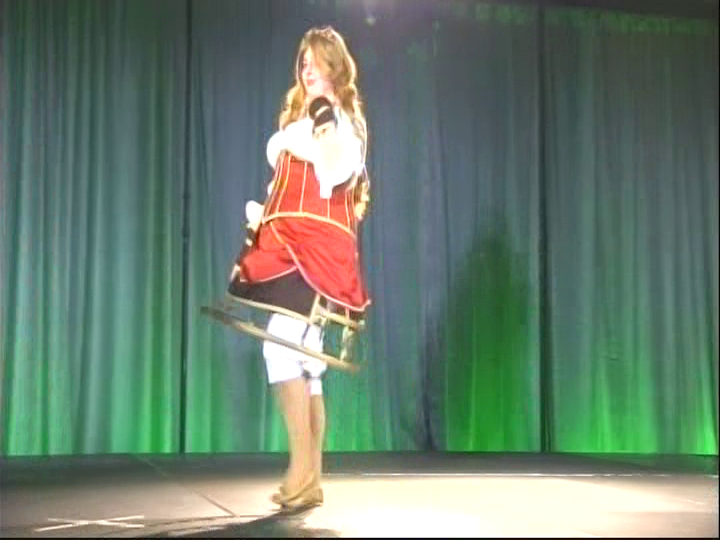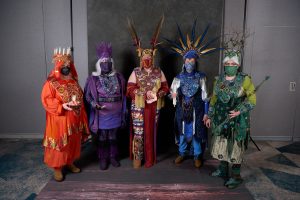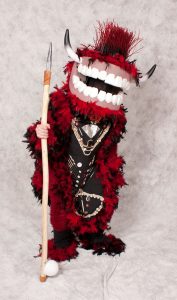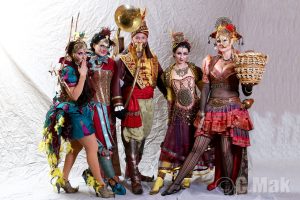CC35-SF-66e: Not the Red You Know
Competition Staff & Rules
Staff:
- Director: Maral Agnerian
- Master of Ceremonies: Gordon Rose
- Presentation Judges: Bethany Padron, Amanda Irwin and Dizzy Lizzy
- Presentation Judges’ Clerk: Unknown
- Workmanship Judge(s): Kathe Gust and Phil Gust
- Workmanship Judges’ Clerk: Unknown
Rules:
The F&SF Masquerade is the type of masquerade contest most of us are used to – short stage presentations, backstage workmanship judging, and any type of costume is welcome. That includes anime, video games, fursuits, robots, original designs, anything you can dream up!
The masquerade will take place on Saturday night of the convention. To enter or view the masquerade you must be a member of CC35.
For basic info re: all competitions please check out the Competition FAQ.
Signup: There will be online registration, and you will be able to update or change information until the on-site masquerade registration desk closes. In addition, paper forms will be available at the on-site masquerade registration desk, which we expect will be available near convention registration from mid-morning until early evening on Friday and from mid-morning until early afternoon on Saturday. Registration forms will be available closer to the convention date.
Please note that technical rehearsals are mandatory, and slots must be chosen in-person at the masquerade table. It is advised to sign up for your your tech rehearsal spot as soon as possible, as popular spots fill up fast. Tech rehearsals (more information below) are held early morning to late afternoon Saturday and are approximately 5 minutes each.
Release: All members of each entry must check in at the masquerade registration desk during those periods and all must sign a masquerade release form. The Masquerade Director requires real names to be supplied on entry forms. These real names must match the ones you used to register for the convention. Remember, you can always ask the MC to announce nicknames.
Entry Categories and Skill Divisions
The masquerade uses two entry categories, Original Design and Re-creation, and the four skill divisions recommended by the International Costumers’ Guild: Master, Journeyman, Novice, and Young Fan.
Entry Categories
Original Design costumes are costumes whose design is the creation of the contestant, even though it may be inspired by an illustration or written description of an SF, fantasy, or other source.
Re-creation costumes are duplicates or design adaptations of the published visual work of someone other than the contestant. Their design is copied from a film, television show, theatrical presentation, illustration, comic, work of art, or other medium showing at least one good view of the work copied. Examples of re-creation sources include (yet are not limited to) games, graphic novels, Japanese media, paintings, photos, movies, and TV shows.
A costume designed from a written source and the entrant’s imagination is not a recreation costume. It’s an original costume.
Some judges may not be familiar with your visual source. Consequently, re-creation entries require documentation of the source in the form of at least one image of the work being copied or adapted. Please do not submit original images, books, DVDs, thumb drives, or any valuable items.
Skill Divisions
Skill divisions are intended to ensure that both new and experienced costumers have a reasonably equal chance to win an award. The division system is not intended to provide recognition; the awards themselves do that. It exists merely to promote fairness. Outside of any single competition, division ranking is meaningless.
The Fantasy & Science Fiction masquerade’s skill divisions are as follows:
- Master: Any entrant may compete in the Master division.
- Journeyman: Professional costumers may not compete in the Journeyman division. A contestant who has competed and won in the Master division at an international competition (Worldcon, Anime North, or Costume-Con masquerade) or in the Craftsman division at a large regional convention may not compete in the Journeyman division. A contestant who has won “Best in Show” or “Best Journeyman” at an international competition may not compete in the Journeyman division. A contestant who has won more than three major awards in the Journeyman division in international competition may not compete in the Journeyman division. Anyone else may compete in the Journeyman division.
- Novice: Professional costumers may not compete in the Novice division. A contestant who has competed and won in any division other than Novice at an international competition may not compete in the Novice division. A contestant who has won “Best in Show” or “Best Novice” at an international competition may not compete in the Novice division. A contestant who has won other major awards in the Novice division at international competitions is encouraged to enter in the Journeyman division or higher and should discuss with the Masquerade Director which level to choose.
- Young Fan: An entrant who is under 13 years of age on the day of the masquerade and who is not part of an adult entry may enter the Young Fan division. This division is for costumes designed and/or made by the young fan, either in their entirety or with assistance from adults (such as parents). A child wearing a costume designed and built entirely by an adult should be entered either in the adult’s appropriate skill division or Not in Competition.
Group entries should compete at the level of the group’s most experienced member(s).
A competitor may compete in any division that s/he is eligible to enter. However, if the competitor receives an award in a higher division, they must compete in that division (or higher) in future competitions. If in doubt about which division to enter, consult the Masquerade Director.
Presentation Information
Stage: The dimensions and shape of the stage will be provided later. However, at this time, we expect that entrants will be able to use both stage right and stage left to enter or exit the stage. There will most likely be no center stairs or runway. The Master of Ceremonies will be located either stage right front or stage left front.
Masquerade Tech Rehearsal: All entrants must take part in a technical rehearsal on stage on Saturday before the masquerade. This is an opportunity for the masquerade director, MC, stage manager, and the tech crew to work with you to assure that sound and lighting support your presentation. Entrants need not wear costumes for the tech rehearsal; however, you should wear the shoes you will use for your presentation and any parts of your costume that will impede your movement or vision, or both. Please bring a part of the costume that represents its dominant color(s) for a lighting check. You will do one or two run-throughs of your entry with light and sound, approximately 5 minutes.
We expect that tech rehearsal times will begin early Saturday end late that afternoon. To sign up for rehearsal times, entrants will choose their rehearsal slots at the masquerade registration desk, on a first-come-first-served basis. Entrants who do not participate in the tech rehearsal will not be permitted to participate in the masquerade.
Beyond the tech rehearsal, we encourage entrants to rehearse, rehearse, rehearse. We hope to make available somewhere a space with the stage dimensions marked out that entrants may use on a first-come, first-served basis.
Green Room: Come to the masquerade green room when it opens officially. (The time and place will be posted at the masquerade registration desk.) Check in with the person at the check-in table. You will learn your number in the running order and will be assigned to a den of entries just before and/or after you, where you will be in the care of a Den Parent. Go to your den, introduce yourself to the Den Mom/Dad assigned to you, and take a seat. Please stay there until it is time to go on stage, so staff can find you easily if needed.
Den Moms/Dads: If you need anything, let the Den Parent assigned to you know. We plan to provide light refreshments and to have a manned repair table should a costume need repairs. The repair table provides glue, safety pins, needles and thread, tools, and so forth. It is for last-minute repairs, not for building or completing a costume.
Your Den Parent will see that both the official masquerade photographer and the photographer taking reference photos for the judges photograph your costume. We expect that official photos will be available for purchase by you and other convention members, possibly the next day. Your Den Parent also will take you to the workmanship judges, should you decide to have your workmanship evaluated (see below), and will get you to the stage at the right time and in the correct order. You must be in line and ready to go onstage when your entry number is called. If you miss your call, your entry may be dropped.
On Stage: Back stage, there will be stage ninjas at the wings to help you up and down the stairs, move props on and off stage, and catch you if you stumble. We need to know how much assistance you need, especially if your vision is obscured by a mask or by not wearing your glasses, or if your costume limits your range of movement. The more assistance you need, the earlier you should let us know (preferably at the masquerade registration desk).
There also will be stage ninjas at the front and sides of the stage to try to stop you from stepping off the stage by mistake. If you hear someone shout, “Stop!” during your presentation, do so; you are in immediate danger of falling off the stage! However, if you dance, run, hop, skip, or jump so fast that the catchers cannot stop you, you are responsible for your own safety.
Plan on using stairs with non-removable handrails to enter/exit the stage. Do not plan on using a ramp, as one will probably not be available. For those entries with mobility issues, please contact the Masquerade Director to discuss options.
The young fan entries (see below) will appear first during the masquerade and the judges will immediately make their decisions before the adult entries appear on stage.
Constraints on Presentations
All general rules for the Costume-Con 35 stage apply to the science fiction and fantasy masquerade.
Safety and Weapons: Safety is our paramount concern. Special effects must be clearly described to the Masquerade Director and to the stage manager and tech crew at the tech rehearsal in order for us to determine that they are (1) legal and (2) safe. Strobe lighting, for example, has the potential to be harmful to members of the audience.
No fire or open flame will be allowed on stage.
The “no peanut butter” rule applies: No messy substances – wet, dry, sparkly, or oily – that might ruin another costume are allowed on stage or in the Green Room.
No smoking in any Masquerade area.
Weapons: If your entry includes displaying a real or fake weapon, the Masquerade Director must clear it ahead of time to ascertain that it will not harm other entrants, the judges, or the audience. No sharp edges or points will be permitted. If you intend to point a weapon at other members of your entry or at the judges or the audience, you must demonstrate in advance to the Masquerade Director that the weapon does not work.
Weapons permitted in the masquerade that otherwise are not permitted at the con must be carried into and from the green room in secure wrappings and be peace bonded.
Finally, entrants may not throw anything at the audience or judges.
Time on Stage: You have a maximum of one minute on stage. (The Masquerade Director may allow large groups additional time on stage.) Fen tend to be easily bored, and taking too long on stage can ruin a good costume and presentation. A good presentation takes sufficient time for the judges and audience to see your whole costume and then ends. If you exceed your allotted time, your lights and sound will fade or we may use a large hook to remove you.
Recorded Material: There will be NO microphones available for contestants to use onstage; please do not speak or sing onstage as the audience will not be able to hear you. Music and/or narration or dialog as part of your presentation must be pre-recorded (except for a script to be read by the MC). Provide your recordings as a data file on CD-R (not CD-RW), or as a WAV or MP3 file on a USB drive. Two copies must be handed in at the masquerade registration desk as early as possible so that the tech crew can program sound for the show. The copies should contain only the music and/or speech you want played AND NOTHING ELSE; please do not provide a commercial CD and ask us to play a specific track. We will not accept other sound file formats nor can we play audio from tape cassettes, iPods, or similar devices. We strongly recommend that you bring several copies of your recording, to provide a back-up should one fail. We also suggest bringing copies in more than one medium (e.g., a CD to back up a USB drive), just in case. Label your recordings with the entry title and your name. Sometimes CDs and USBs go astray after the show, so please do not turn in anything of value.
If the sound runs longer than your presentation or must be cut on cue, please be very specific as to when to cut. The usual cue is to fade the sound as the entrant leaves the stage. It is best, when you want the sound to end at a specific point, to record the material you want to a custom track. If your track has silence on it, please include a note of this so as the techs know to expect this and don’t stop the track prematurely.
Submit one copy of your audio to Masquerade Registration when you complete your registration forms. If you have made a second copy, bring it backstage with you to the Masquerade.
Note: We must receive your audio when your registration form is submitted. If we do not have your audio by the close of registration, we will NOT play your audio on stage.
Lighting: The default lighting for each entry will be dim (half-lit), rising to full lighting when the entry is announced, fading to dim (half-lit) on exit. Entries are able to request additional lighting changes for their presentation; the tech rehearsal will help the lighting crew determine what will work best for you.
In addition to noting all lighting requests on your registration form, please discuss the request with the registration staff when you submit your form and during your tech rehearsal. It is highly recommended that your lighting cues be tied to a time on your audio track — for example, “At 35 seconds, dim the lights for 4 seconds, then bring them back up” — rather than basing your cue on something happening on stage.
Master of Ceremonies (MC): The only person permitted to speak from the stage is the MC. The MC will be happy to work with you in reading a short script or to interact with you during your presentation; remember, however, that you have only one minute on stage. The MC will have only a small light on the podium under which to read scripts. Please provide your script in black double-spaced type on white paper using at least 18-point letters in a plain and easy-to-read font. Put the title of your entry and your name at the top of the script.
Without an introduction, the MC will announce only your entry number, division, and title at the beginning of your presentation. When your presentation is complete, general credits will be announced.
Other Constraints: We discourage the use of radio controlled or other wireless devices as part of an entry. We do not know what sort of interference will exist in the hall during the show. It would be unfortunate to base your entry on something that doesn’t work when you are on stage.
All contestants must be registered attending members of CC-35. This includes both designers and models.
No purchased or rented costumes may be entered in this competition.
This competition is rated PG-13, so no nudity, please. “No costume is no costume” still applies.
No contestant may appear on stage more than once. Costumers may enter more than one costume, but each must appear on a different model. No “cameos” allowed, either.
Never Surprise the Crew: Entrants should surprise the audience. Never surprise the crew! No exceptions to the “never surprise the crew” rule will be permitted and entrants who attempt to do so will be disqualified.
Hall Costumes: We want to see your costumes. Therefore, there is no prohibition against presenting on stage costumes worn in the halls before the show or at other conventions. However, the reaction of the audience and the presentation judges to a costume seen in the halls may be more muted than it would be for a costume not seen before since they will have had an opportunity to observe it at length and in detail.
Judging
The judges will consider both entry categories and skill divisions in making their awards. The Fantasy & Science-Fiction masquerade’s philosophy is “excellence deserves award”; there are no predetermined minimum or maximum number of awards the judges may make.
Stage Judging: A panel of judges will be at the front of the audience watching the entries as they present their costumes. They will look both at the costumes and at how they work with the presentation, choreography, music, and/or script. Judging by them is mandatory for all entries except for costumes entered “not in competition”.
Workmanship Judging: Other judges will be in the green room before and during the show to evaluate the workmanship on costumes, or parts of costumes, voluntarily brought to them by entrants. They will evaluate your entire costume or just the part(s) you think are best. This is where exquisite attention to detail may be recognized. Please let these judges know what you are most proud of in your costume. Tell them about how you made it.
We recommend that, if in doubt, you let the workmanship judges evaluate your work, even if you’re not impressed by it. If you don’t, you deny them the opportunity to give you an award! And never tell the judges what you don’t like about your costume or what you feel you did wrong.
Your entire costume need not be judged; you can (and many do!) submit just one part of it for judging. For example, you may present just one prop, or a headdress, or all the beading.
If you think you may want workmanship judging, please check the YES box on your entry form. If you’re sure you won’t, please check NO. This will help us schedule our judges’ time better, to ensure everybody’s work gets a fair viewing.
Documentation: Documentation is required for re-creation costumes. It is not required for original design costumes. The judges will have only limited amounts of time to review your work and documentation, so keep the documentation brief. Photos, design sketches, screen shots, and brief written descriptions of your work are good. Provide copies only — do not bring originals.
Awards: Awards will be presented when the judges have reached their decisions. Their deliberations usually take some time; this is not like “Dancing With the Stars.” After the show, contestants are usually brought onstage to pose for fan photos while the judges deliberate. It is not mandatory, but if you’re competing, we urge you to stay in the area and be prepared to be called back on stage for an award. Awards will be announced by skill division and will include both awards for stage appearance and for workmanship. In addition, some ICG chapters and other groups may have awards to bestow.
Photography
Official Photography: The official masquerade photographer will photograph your costume(s) before the show starts. This is not optional.
Fan Photography: Fan photography may take place from the audience during the show, using available light (not flash). In addition there probably will be an on-stage “photo run” for fan photographers after the last entry’s presentation (while the judges are deliberating); if so, your participation would be optional.
For the safety of those on stage, use of flash photography from the audience during the show is strictly prohibited. The Masquerade Director will stop the show and have the house lights turned on until those using flash have been ejected from the hall.
Contact Masquerade Director
Online registration is now available here. It is not mandatory; you can still sign-up onsite at the convention if you choose. Those who signup online must still check in at the Masquerade desk at the convention to provide signatures for all entrants and choose a tech rehearsal time.



